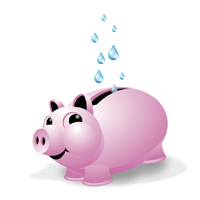 From LiberalHexum.com:
From LiberalHexum.com: Can we stop global warming? Of course. The question is this: will society be smart and plan ahead to avoid catastrophe or will we wait for more and more disasters until it becomes painfully obvious to the entire population? I’m hoping for the former.
There is cause for hope. Humans can repair environmental crosses. We have in the past. Take ozone depletion for example; scientists realized (in the 1980’s) that a certain Chlorofluorocarbon or CFC was causing a hole in the ozone layer. Chemists changed the formula for the freon and aerosols and now the ozone layer is repairing itself.
What can an individual do?
A person could reduce their carbon emissions by 70% by trading in their SUV for a hybrid car.
There have been huge recent advances in the feasibility of wind generators (windmills) and solar panels. A person can run there whole house on solar or wind and in many cases sell power back to the grid.
One might ask, why is it important to conserve electricity? Light bulbs don’t give off carbon.
Answer: Because unfortunately the generation of that electricity often comes from burning filthy coal. For example, Southern California receives half of its electricity from coal-fired plants in Utah, Arizona, and Nevada, and because of that is considered one of the dirtiest public-owned utilities in the country. And we thought Californians were progressive!
I believe that personal responsibility in reducing ones emissions is part of the solution but I think that the government holds the real key. The biggest polluters are corporations and history has shown they do not change there ways unless they have to. There needs to be a combination of tax incentives for companies to clean up and fines for companies that pollute.
sources:
Tim Flannery
author, The Weather Makers
internationally acclaimed scientist,
prof., Univ. of Adelaide, Australia:
Wikipedia
 Gov. Arnold Schwarzenegger and legislative leaders agreed Wednesday on a plan to cut by 25% the amount of greenhouse gases emitted from California electric power plants, refineries and other sources by the year 2020.
Gov. Arnold Schwarzenegger and legislative leaders agreed Wednesday on a plan to cut by 25% the amount of greenhouse gases emitted from California electric power plants, refineries and other sources by the year 2020.







